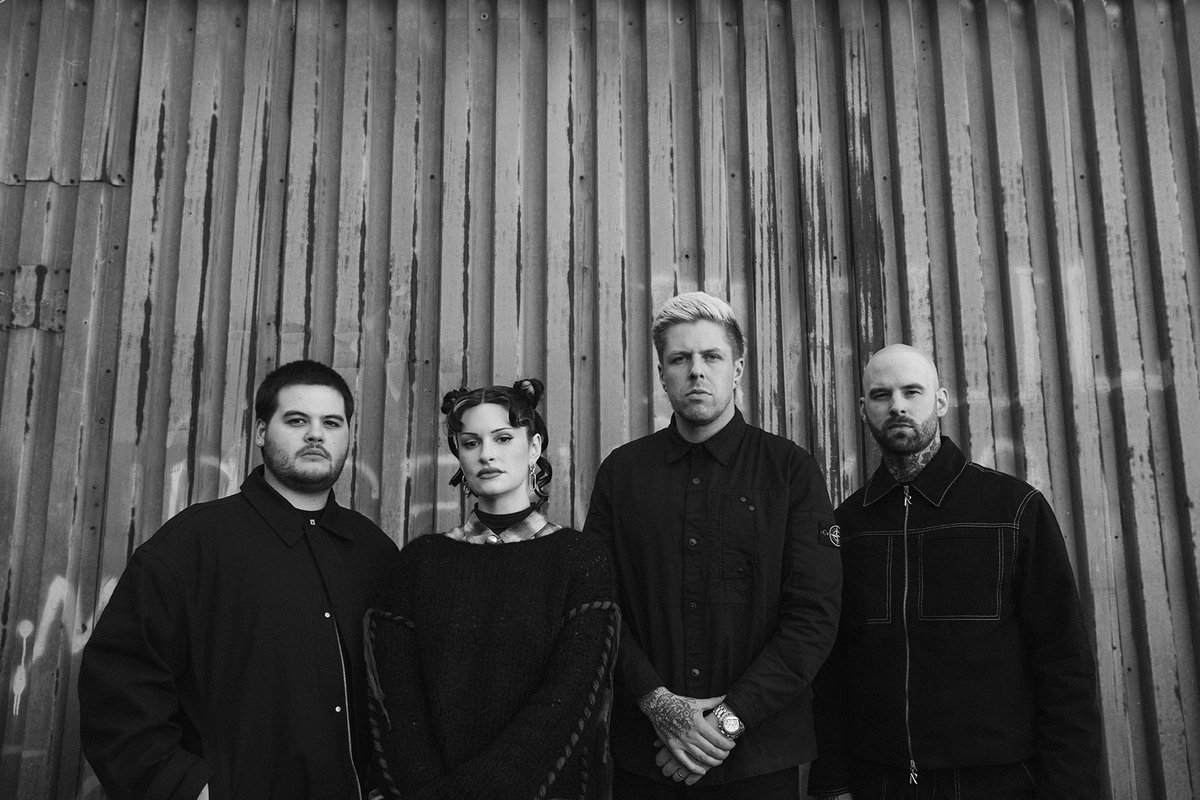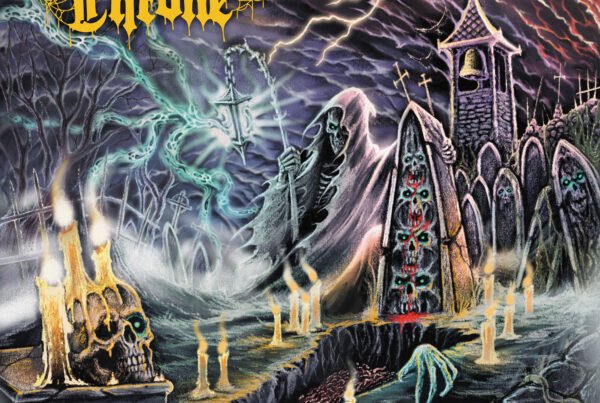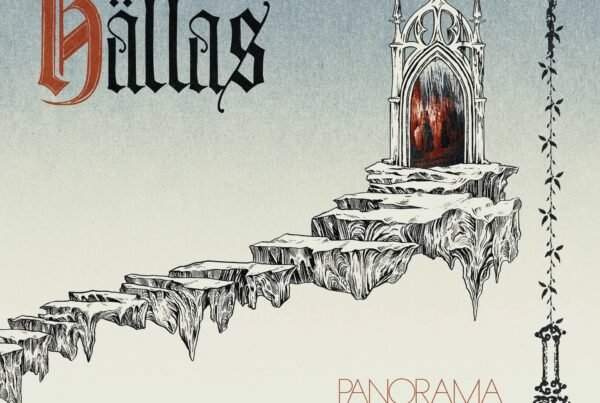Spiritbox refine their sound with a new helping of modern metalcore – for better and for worse.
Release date: March 7, 2025 | Pale Chord Music | Instagram | Facebook | Bandcamp
During the 1990s, when I was just a wee lad, the term ‘metalcore’ was but a blip in the occasional music zine (itself an ancient term), a descriptor applied to the hardcore punk bands of the era that were applying that genre’s ecological and social awareness to thrash metal’s precision and technical prowess. Groups like Earth Crisis and Poison the Well released albums that admirably pulled off a combination of hardcore chugging, metallic grooves, melodic guitar leads, and punk shouting alongside spoken word and sung vocals – often all within the same taut, 3-minute ditties.
The fact that these bands emerged around the same time as melodic death metal bands from Europe (the Big 3 of which are generally agreed upon as being In Flames, Dark Tranquility, and At the Gates, although I’d also throw in Carcass for good measure) is purely coincidental; however, a similar desire on the part of both musical movements to marry the underground appeal of hardcore with the more commercially accessible aspects of then-modern metal proved to be a crucial influence in the development of the next generation of metalcore musicians. As the 2000s drew on, bands like Killswitch Engage and All That Remains took melodic death metal’s MO – twin guitar leads soaring over driving drums and wretching screamed vocals – and added hyper-melodic sung choruses into the mix, creating what most people in my generation (millennials, ugh) now refer to as ‘metalcore.’ Heck, even in the late ’90s, a little group called Shadows Fall released their debut album of lo-fi death metal – featuring no less than the aforementioned All That Remains’ future vocalist Phil Labonte – before gradually transforming into another of these half-screamed/half-sung melodic metalcore acts. This sound proved to be the public face of mainstream metal for the next several years and an indelible part of many young rock fans’ introduction to harder styles of music (myself included).
Fast-forward to the 2010s and with rock as a genre becoming less of a mainstream force in popular music, this melodeath-influenced metal was burning out. Many bands of the time either continued putting out new material to diminishing returns (Killswitch Engage), attempted to rebrand in the wake of a self-imposed hiatus (As I Lay Dying‘s instrumentalists’ enjoyable but commercially unsuccessful attempt to strike hard rock gold with the underappreciated Wovenwar), or made ill-advised left turns into cock-rock worship in pursuit of sports ad glory (Atreyu). The metal landscape is no longer as partitioned and insular as it once was, and metalcore groups have continued to experiment with the genre’s boundaries and influences to broadly variable results. America’s own Periphery kicked off an uptick in fusing Meshuggah‘s downtuned progressive sludge with modern metalcore sensibilities, ie. an emphasis on pop-punk caterwauling next to nu-metal’s whisper-to-screaming vocals, a formula which was quickly replicated and tapped dry of its novelty by fledgling ‘djent’ acts (as it’s come to be known, much to purists’ chagrin). Elsewhere, the UK’s Loathe have found a happy medium between hardcore bludgeoning and some healthy Deftones aping, current TikTok du jour collective Sleep Token have bolted chilly alt-R&B onto djent aesthetics to wildly popular results, while newer groups like Dying Wish have continued flying the flag for that 2000s-style melodeath-influenced melodic metalcore in a solidly enjoyable (if nostalgic) fashion. With such a storied history to a genre that now flanks so many subdivisions and approaches, where does Canada’s Spiritbox fit into this equation?
Oh, right: by this point in the review, you forgot this was about Spiritbox. That’s by design, because discussing metalcore’s history and its offshoots over the years brings us to this precise place in time. Rising from the ashes of underground grindcore favorites iwrestledabearonce, Spiritbox has carved out a niche for themselves as practitioners of contemporary metalcore – one part calculated djent riffing, one part nu-metal stomping, and one part melodic Evanescence-esque crooning courtesy of frontwoman Courtney LaPlante. While this may seem to more jaded listeners a clear bid for mainstream acceptance that was never afforded to iwabo, it seems with every new Spiritbox release – from their first EP in 2017 to their 2021 debut full length Eternal Blue all the way to this year’s Tsunami Sea – there is an effort on the band’s part to push their sound and influences further in each direction, going darker, more melodic, or flat-out weirder, depending on the track.
Of course, such experimentation inevitably produces varied results. Fortunately for Spiritbox, with such experienced members in the mix (now including former As I Lay Dying guitarist Josh Gilbert), the band knows its way around memorable hooks and riffs, which is immediately on display on Tsunami Sea‘s opener “Fata Morgana” – a lurching, nigh-industrial groove infused with Gojira-like pick scrapes gives way to LaPlante’s throat-shredding wailing about mirages and stagnation – a fitting metaphor for the creative process, no doubt. When the clean chorus breaks in, her vocals are rich and warm, despite the mixing job burying them a bit more than they should.
The songs that remain heavy throughout their runtime fare the best – “Black Rainbow” with its alien vocoder effects in the verses bursting into warped guitar leads and rapid-fire guttural bellowing, “Soft Spine” with its bile-filled lyrics targeting corrupt power structures and ‘rewarding sick behavior‘ (a commentary on the music industry at large if ever there was one), “No Loss, No Love” which features some of the most intense vocals on the album rubbing elbows with electronics and lyrics about the natural world as a living, breathing, vengeful entity – a beguiling combination. “Keep Sweet” mixes peppy breakbeats with clear Architects ca. 2017 influence into an appealing concoction of styles, one that Spiritbox could easily lean more into on future projects.
The lighter tracks don’t fare as well due to the meager mixing of the clean vocals – “Perfect Soul” has intriguing lyrics that can be hard to parse underneath the pop-djent rhythmic attack, which is a shame as the track aims for a kind of devastating uplift that really only hits at the very end when all the other instrumentation drops out and LaPlante’s vocals finally come front and center: ‘My dreams are just a fantasy/And that is all they’ll ever be/I turn the lights out on a thousand eyes all watching, waiting‘. In a live setting, I can imagine this song having a strong emotional impact; on record, the limited dynamic range in the production weakens it. The title track could be broadly termed a love song, with lyrics like ‘I wait as you hold your breath for someone I’ll never be/Out of my depth, you got me dreaming but I know/How deep it goes‘ pointing to insecurities in a relationship and trying to overcome them; unfortunately, despite the emotional honesty, the wall of guitars during this chorus crush down LaPlante’s gently sung vocals, leading to a harsh contrast that throws off the balance of sounds. “Ride the Wave” brings in sampled drums and LaPlante goes for a different kind of swagger in her singing style but the song walks in place for most of its runtime until the bridge welcomely kicks the intensity up. Thankfully, these moments don’t ruin the album experience, but the band could stand to learn that a different production and mixing style would serve their softer moments better and give them the space they need to land emotionally with the listener.
Thankfully, Spiritbox saves the soaring “Deep End” for last: LaPlante’s vocals are passionate and her melodies memorable enough to push through the mix, adding up to a strong and satisfying finale. Compared to their debut album, Tsunami Sea is better paced and balanced, a holistic experience with recurring themes of drowning in an ocean of self-doubt, rather than a collection of unrelated singles. The band’s lyrics and sonic influences prove to be their best assets, and their performances are almost always on the ball; what they need now is a shake-up to their production style. Most modern metal listeners have grown accustomed to the compressed, gridded sound that is the current norm for this genre; to me, it represents a desire to hit like pop music while retaining a harder edge. In practice, this is easier said than done – pop’s straightforward, polished structure and metal’s dominating complexity don’t make for the most comfortable bedfellows, like two different worlds competing for ultimate power. Spiritbox fall on the right side of this battle due to their talent as songwriters and performers; let’s hope that for album #3, they allow their sound the raw dynamism it needs to let them fully take flight and become the best version of themselves.






